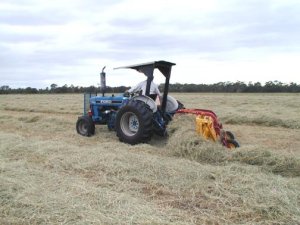Horse Hay - A Cash Crop for Florida Cattlemen

During the past several decades, as the pleasure horse population has increased in Florida, so too has the need for high quality hay. The Florida horse population uses approximately 700,000 tons of hay annually of which only one-third is produced in Florida.
Most horse hay is produced in northern part of the state. Coastal bermudagrass is the major horse hay produced in Florida with perennial peanut rapidly growing in popularity. However, in recent years IFAS has developed and released ‘Florona' stargrass and ‘Florakirk' bermudagrass and tested ‘Tifton 85' and ‘Jiggs' bermudagrass. All these grasses produce good yields, are fine stemmed, leafy, and average 12 to 20% crude protein and have good digestibility when fertilized and harvested at a cutting frequency of 4 to 5 wk as recommended by IFAS. During most years four cuttings of hay can be obtained, two in the spring and two in the fall. In central Florida these grasses can be fertilized in early February when soil moisture is still available with the initial spring hay crop being harvested by mid to late March. Hay fields are fertilized again immediately after initial crop removal for a second harvest in mid May. June, July, and August generally do not lend themselves to hay harvest because of tropical summer rains. However, summer grass production can be grazed off by beef cattle or allowed to mature for about 60 days or more for use as planting material.
In late August to early September hay fields are mowed to remove summer growth and fertilized for the third hay crop (mid October). Fields are again fertilized in mid October for a forth hay harvest around Thanksgiving.
Each hay crop will produce about 1.5 to 2.0 tons/acre dry biomass or about 6 to 8 tons/A hay over four harvests. Presently Florakirk hay is selling at feed stores for $5.00 to 5.50 per 50 lb bale. Generally 60 to 80 bales can be produced per acre per cutting. Fertilization costs (16-8-16, plus micros at 500 lbs/A) will average about $56.00/acre/harvest. Custom rates for cutting, raking, and baling will average 1.75 /bale for rectangular bales and $20.00 for large round bales. Feed store merchants indicate that horse owners prefer small rectangular bales, but will buy large round bales of Florakirk bermudagrass, provided the hay is of good quality, mold, and dust free. This is good news for the hay producer, since large hay bale producers can be completely mechanized eliminating hand labor and reducing production costs.
Establishment costs for bermudagrass and stargrass will range between $300 to $350/acre. Generally grasses can be ready for the first hay harvest 60 days after planting. To help growers master the establishment system IFAS developed a video "Pasture Renovation Using Vegetative Material" available from IFAS Extension Bookstore web site at http://ifasbooks.ufl.edu or by calling 1-800-226-1764.
The main objective when making horse hay is to produce a mold free, high quality product. Since horses have a more delicate digestive system, they can not handle poor quality, high fiber, high cellulose hay material. Cattle can ferment poor quality hay in the rumen, but horses are hind-gut fermentors. That means horses must chew forage very well to avoid blocking the system, causing impaction and colic.
Horse hay production is not for all growers since care must be taken to harvest each hay crop on a 4 to 5 wk schedule when weather is conducive to hay making. Hay can be sold directly from the field to the horse owner, eliminating the need of large storage facilities. However, if hay is not sold when produced, some type of storage will be needed. It is best to store hay on pallets allowing air circulation and keeping hay off the ground or concrete floor eliminating the absorption of moisture into the hay and the development of mold problems.
If additional information is desired contact Paul Mislevy at 863-735-1314.

